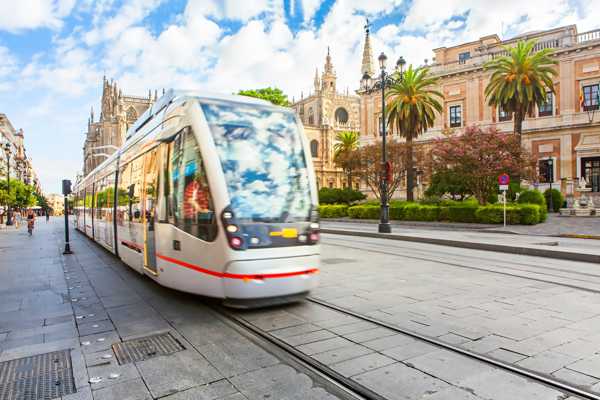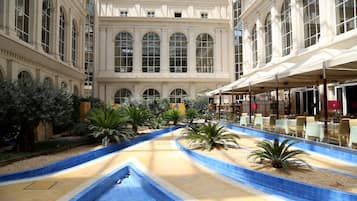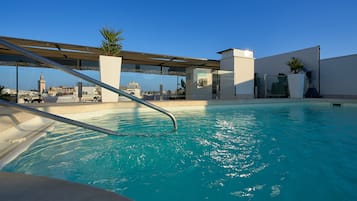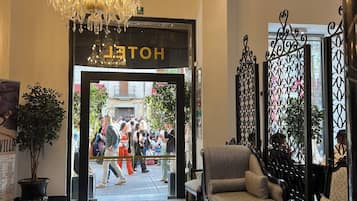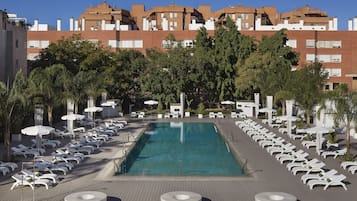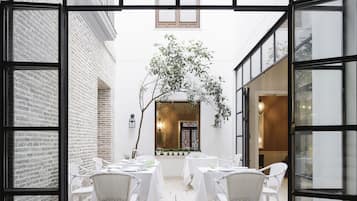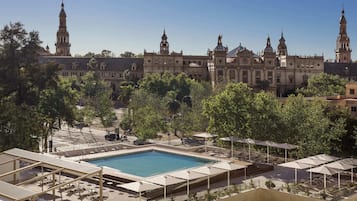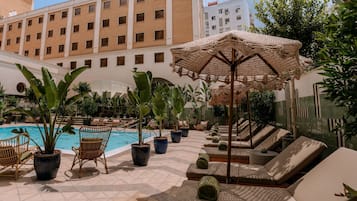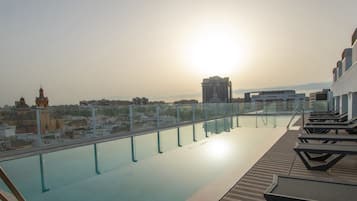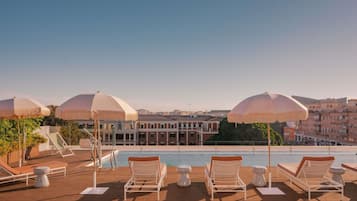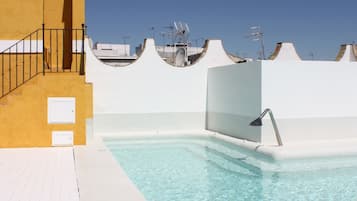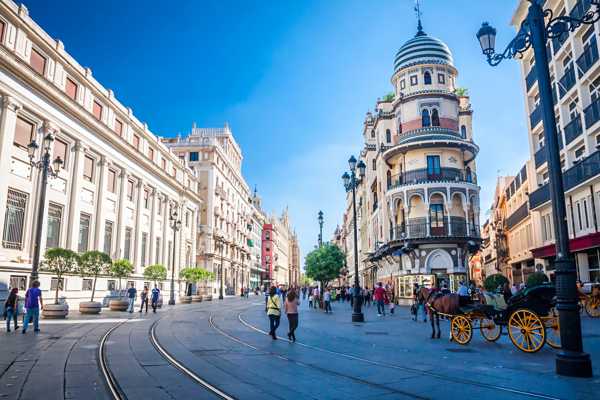Seville has a special colour', sang the pop group Los del Río. This is a city that leaves its mark on all who visit it: the climate, the cuisine, its people and its art. Seville is full of stunning buildings from all the various eras of the city's history. Every corner lives and breathes art.
This means that a lot of Seville's culture can be enjoyed free of charge. Make sure you pay attention: our guide of free things to do in Seville will help you to make the most of your stay in Andalusia's capital without having to dig too deep.
- 1
Wander the streets of the Triana neighbourhood
Discover a village within the city of Seville

- Budget
- History
- Photo
Triana is a typical Seville neighbourhood on the banks of the River Guadalquivir. With its own special charm, it resembles a small village within the big city. Reach it by crossing either the Isabel II or Triana bridges, everybody around here knows the area.
It is a very photogenic place, as the views of Seville with La Giralda in the background are stunning. Cross the bridge and wander through Triana's narrow streets, passing by the brightly-coloured houses in Calle Betis and the famous covered market, and experience the ambience of this flamenco neighbourhood with its gypsy roots. You can also find great hotels in Triana from which you can better explore the area at your own pace.
Location: Barrio de Triana, 41010 Seville, Spain
Map - 2
Join a free walking tour
Get to know the history of the city free of charge

- Budget
- History
- Photo
Join a free walking tour and let a local guide show you the most charming corners of Seville's old quarter. The walking tours pass by the city's most important monuments: the City Hall, the cathedral, La Giralda, Real Alcázar, the General Archive of the Indies, Torre del Oro, the Royal Tobacco Factory and Plaza de España.
This is a chance to really get to know the city's history free of charge, including its Roman origins through its time as the capital of Moorish Al-Ándalus, the coming of the 16th century just as Seville was becoming the most important city in the world and the time when it was home to both the Catholic Monarchs – Queen Isabella I of Castile and King Ferdinand II of Aragon – and Christopher Columbus. The tour lasts approximately 2 hours. We recommend you book the tour in advance, as it fills up quickly.
Location: Plaza Nueva, 1, 41001 Seville, Spain
Open: Daily starting at 10 am
Map - 3
Take a stroll through Plaza de España
Don't miss one of the jewels in Seville's crown

- Budget
- Couples
- History
- Photo
Plaza de España, in the city centre, is one of Seville's treasures that really shines. This is a magnificent site covering 50,000 square metres in a semi-elliptical form that symbolises Spain's dominion over its territories in the Americas. It was built as the site for the Ibero-American Exposition of 1929 to reflect the city's various architectural styles.
Walking around Plaza de España is almost like visiting the entire country – its ceramic-tiled benches depict Spain's provinces, while between the arches, you can see the busts of famous figures from history, such as Quevedo, Magellan and Velázquez. Many of Seville's best hotels are around this plaza.
Location: Avenida de Isabel la Católica, 41004 Seville, Spain
Map - 4
Visit Seville's Museum of Fine Arts
Admire the very best of Seville's baroque painting

- Budget
- History
Seville's Museum of Fine Arts is a must-visit if you are interested in culture and art. This is one of Spain's most important art galleries, and it's free for European Union residents. The museum is housed in an old convent in the city centre, between Calle Sierpes and Calle Tetuán, in a popular area for pedestrians.
The visit allows you to better get to know Sevillian baroque painting by the likes of Murillo, Zurbarán and Valdés Lea, among others. The subject matter is predominantly religious, although there are also rooms dedicated to Andalusian painting from the 19th century. If you go on Sunday morning, you will coincide with the art market held in the plaza opposite.
Location: Plaza del Museo, 9, 41001 Seville, Spain
Open: Tuesday–Saturday from 9 am to 9 pm, Sunday from 9 am to 3 pm (closed on Mondays)
Map - 5
Explore the General Archive of the Indies
Relive the discovery of America

- Budget
- History
The Archivo General de las Indias (General Archive of the Indies) is one of the most important archives of documents from the discovery of America. This historical treasure was created in 1785 in order to bring all the documentation referring to Spanish possessions in the Americas between the 15th and 19th centuries under one roof. Today, the museum has 43,000 files containing 80 million pages, as well as 8,000 maps and drawings.
The archive, declared to be of interest to world heritage, is housed in Casa Lonja, a building whose exterior follows the style of Madrid's court architecture. On your visit, also admire the interior decoration, especially the details in the vaulting on the top floor. Don't forget to look up!
Location: Avenida de la Constitución, s/n, 41004 Seville, Spain
Open: Tuesday–Saturday from 9.30 am to 4.45 pm, Sunday from 10 am to 1.45 pm (closed on Mondays)
Map - 6
Go to a free flamenco concert
Have your first flamenco experience at La Carbonería

- Budget
- Photo
Going to a free flamenco concert is an ideal budget-friendly activity when you visit Seville. Although it is somewhat hidden away, La Carbonería is one of Seville's liveliest tablaos, or flamenco venues. This is really a traditional local tapas bar that has live music, as it only offers moments of flamenco every half-hour to its clientele.
See a visit here as a chance to get into flamenco without any commitment because the show is completely free and you only pay for the tapas you have. Although it might not be the most 'authentic' flamenco experience, it is nevertheless a great baptism, a way to find out if you like the style and want to spend more following the 'Ruta de Tablaos' through Seville.
Location: Calle Céspedes, 21A, 41004 Seville, Spain
Open: Daily from 7 pm to 2 am
Map - 7
See the tears on La Macarena
Check out the realistic expression of pain on the Virgin Mary's face

- Budget
- History
- Photo
Seville's Virgin of Hope of Macarena is the object of the greatest popular devotion in Seville's Easter Week. It can be found on the high altarpiece at the Basilica de la Macarena. It is a 175 -centimetre-high baroque religious figure that's sculpted from pine and cypress wood. The most surprising detail is undoubtedly the set of 5 glass tears that run down her cheeks. They represent the 5 anguishes suffered by the Virgin.
Take advantage of your stay in Seville to visit her – the expression of pain on the Virgin's face will not fail to move you. Access to the basilica is free, and the Macarena neighbourhood is a very popular area that is full of recommended hotels.
Location: Plaza de la Esperanza Macarena, 1, 41002 Seville, Spain
Open: Daily from 9 am to 2 pm and 5 pm to 9 pm
Map - 8
Visit the historic El Jueves market
Explore Seville's oldest market and take home a memento

- Budget
- Shoppers
As the El Jueves market's name suggests, Calle Feria is filled with stalls every Thursday. El Jueves is Seville's oldest open-air market, with a tradition going back centuries – Cervantes even mentioned it in his novella 'Rinconete y Cortadillo'.
This is a market at which you can find everything, including antiques, second-hand shoes, old books, decorative items, bicycles, musical instruments and even flamenco and wedding dresses. You might just find that thing you've been looking for for ages. That said, you'll have to look hard. Even if you're not looking for anything particular, it's still likely that something will catch your eye. El Jueves is full of bargains, so don't forget to haggle.
Location: Feria, 37b, 41003 Seville, Spain
Open: Thursdays from 8 am to 3 pm (closed Friday–Wednesday)
Mapphoto by Anual (CC BY-SA 4.0) modified
- 9
Go for a picnic in Alamillo Park
Enjoy this oasis of calm in the city

- Budget
- Couples
- Families
- Photo
Alamillo Park is on Isla de la Cartuja. It opened in 1993 after the Expo world fair and over the years has become the lungs of Seville – a green area covering 120 hectares and populated with species typical of the Mediterranean climate.
It is the ideal place for a picnic, as its size allows you to find a cosy spot for a bit of open-air food and an improvised siesta under a pine or oak tree. Alamillo is also perfect if you fancy going for a run, doing an exercise routine or simply taking the chance to breathe pure air in the morning before heading off sightseeing. If you would like to stay near the park, there are numerous hotels close by.
Location: Calle Alamillo, 41092 Seville, Spain
Open: Daily from 7 am to midnight
Mapphoto by CarlosVdeHabsburgo (CC BY-SA 4.0) modified
- 10
See the remains of a Roman temple in Calle Mármoles
Three columns of a Roman temple that couldn't withstand the passing of time

- Budget
- History
- Photo
The remains of a Roman temple in Calle Mármoles include 3 15-metre high columns on a tucked-away Andalusian patio in the San Bartolomé neighbourhood. The columns are part of the little that remains from the colony of Iulia Romula, better known as Hispalis.
We still don't know what role these 3 columns played. It is thought that they could have been part of the access gateway to the monument area dedicated to Liber Pater, the god of fertility and the guardian of the people's freedoms. The visit to the columns is free of charge. Due to its historic importance, you should include Calle Mármoles in any visit to Seville.
Location: Calle Mármoles, 2, 41004 Seville, Spain
Map



